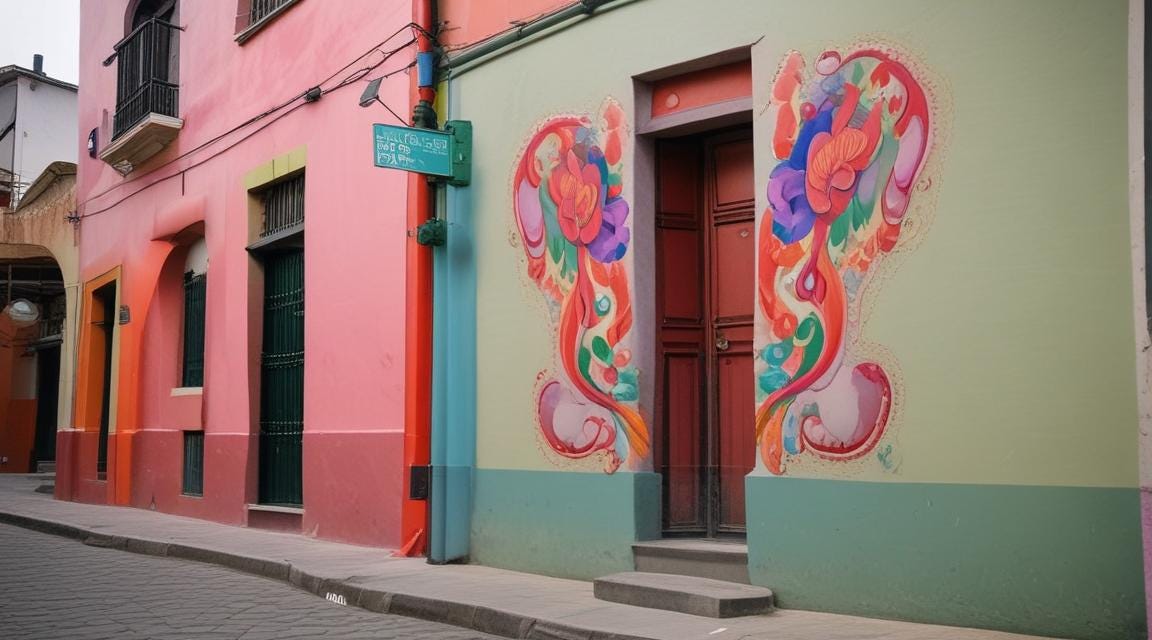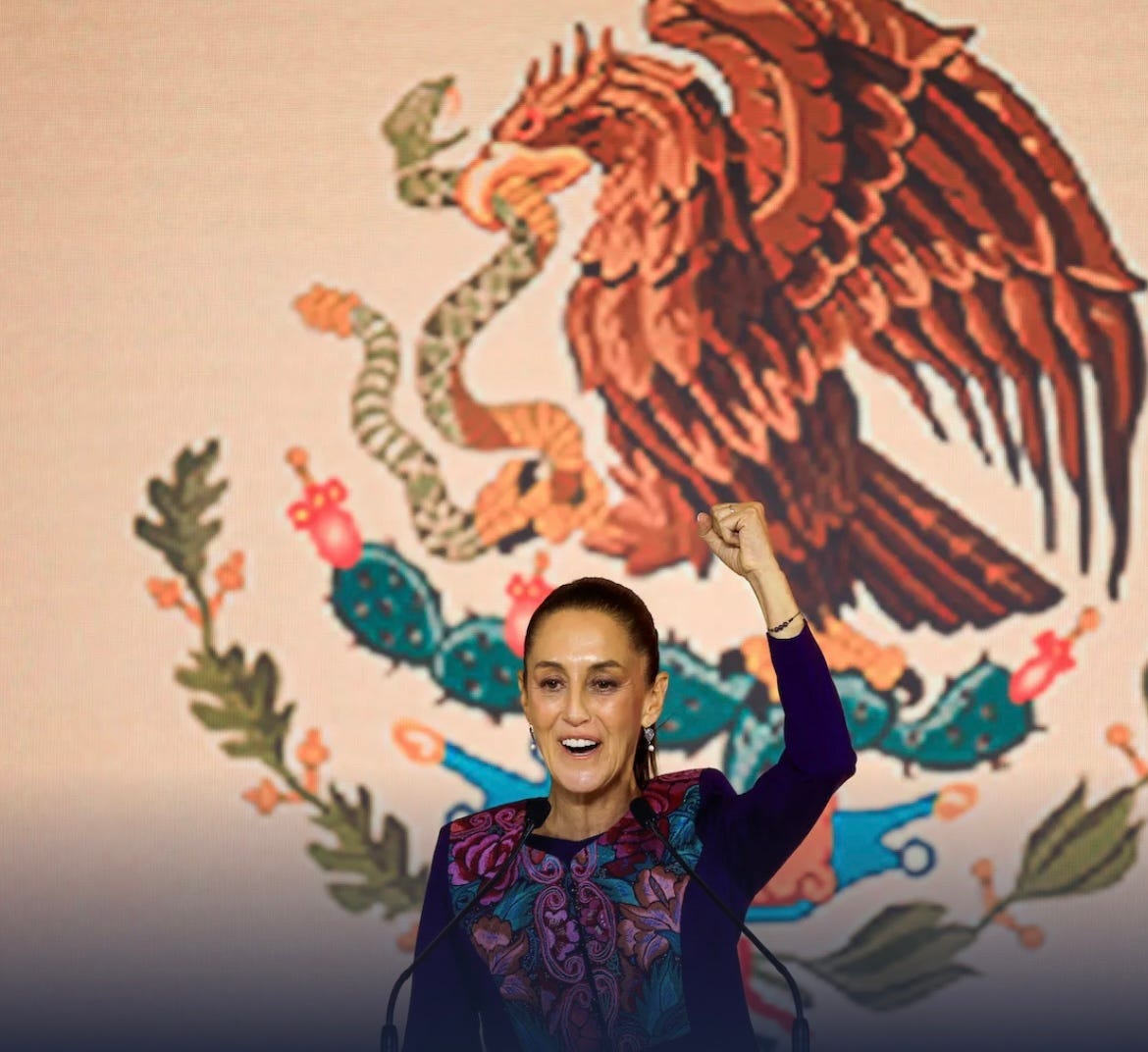¡Adiós, cojones! Mexico's first woman president won by touting her ovaries
Gender quotas helped, too
I was sixteen and living with an Argentine family when I first learned one of my first Spanish expressions for “balls.”
“What does he mean by ‘incha pelotas’?” I, a sheltered WASP from Alaska, asked my Italian-Argentine host sister.
“You know, ‘ball breaker.’ As in, giving someone a hard time.”
And so began my education in the ways of machismo.
I was taught never to ask a grocer if he had any eggs. “¿Tienes huevos?” implied I was challenging his manhood.
When I dated a Venezuelan in Costa Rica (who would later become my husband), rumor spread that my boyfriend had bolas de oro, or “balls of gold.” (Probably because I financed our business and paid for the car he drove everywhere.)
Pelotas, bolas, huevos, cojones… there were so many ways to express a man’s genitalia in Spanish. Clearly, this was a word worthy of many names.
“Do you have a word for feminism?” I once asked the women in my Argentine host family. I had just learned that my host father had forbidden my host mother to sterilize herself, claiming it would make her “less of a woman.”
My host mother and sister said they did not have a word for feminism. This was in 1995, twenty years before Argentina would elect its first female president and twenty-five years before abortion would become legal. But they did have a word for male chauvinism: machista.
Imagine my delight when, almost thirty years later, on June 3, 2024, I read that Claudia Sheinbaum had succeeded the outgoing president of Mexico, Andrés Manuel López Obrador, by proclaiming that she had the “ovaries” to fight organized crime.
Sheinbaum’s opponent, Xóchitl Gálvez, had characterized the outgoing president as a “machista.” “You need many ovaries like the ones I have to confront such a powerful man,” Gálvez stated during her campaign.
The national leader of Mexico’s conservative National Action Party (Partido Acción Nacional, or PAN) endorsed Gálvez, saying she had “the guts and good ovaries.” Basically, the feminine equivalent of “she has balls.”
Or, as they would say in the U.S., “She’s the man.”
Between the two ovary-endowed candidates, Claudia Sheinbaum’s proved victorious. On June 2, 2024, Sheinbaum became the first female president, earning more votes than any other presidential candidate in Mexico’s history.
On Monday, the Washington Post ran an article titled “How Mexico, bastion of machismo, got a female president before the U.S.” Women in the U.S. can now bemoan the fact that our country has been out-feministed by a country where women didn’t earn the right to vote until 1953.
When Sheinbaum is sworn in, four of Mexico's most senior government positions will be held by women: the president, the president of the Supreme Court, the head of the National Electoral Institute, and the mayor of Mexico City. Additionally, almost 50% of the Congress of the Union, the country’s federal legislature, is comprised of women.
In a country where 90% of Mexicans harbor negative biases against women, and 58% hold such biases specifically against female politicians, where feminism is still looked down upon, and eleven women are violently slain on the daily, how is Mexico surpassing the U.S. in its advancement of female political leaders?
Some critics have argued that Mexico elected a female president because there were only two female candidates to choose from. Then how did both presidential candidates end up being female?
It’s all about the quotas, baby
In 1991, Argentina became the first country in Latin America and the world to adopt a 30 percent gender quota law for women candidates.
Mexico followed suit in 1996 and passed a law encouraging at least 30% of candidates must be female. In 2002, an 84% male congress made it mandatory, with the exception of primaries. A lawsuit was launched, and in 2011, that exception was eliminated.
In 2019, a largely female Congress passed a law requiring all political parties to field a pool of candidates made up of 50% women. “While U.S. feminists were focused on breaking the 25 percent barrier for women in the House of Representatives, Mexico became the world’s leader on gender parity,” Jennifer M. Piscopo wrote in Ms. Magazine.
Take notes, ‘Merica
Sheinbaum and Gálvez bolstered their candidacies by reframing their womanhood as a strength. Women candidates in the U.S. and elsewhere could do the same.
In the United States, neither mandatory nor voluntary gender quotas exist in the political sphere. The 2022 World Economic Forum Global Gender Gap Index ranks the country’s political empowerment score 38th overall based on the percentage of women in Congress and the number of years with a female head of state or government. (The United States has never had a female president.)
Yet growing evidence demonstrates that women’s leadership in political decision-making improves the living standards of its population. Higher rates of women in government correspond to less corruption, increased legislation on priority issues for women, and prioritization of education, health, and welfare.
Countries with greater gender equality have made significant progress by implementing gender quotas. For this reason, the U.S. should follow Mexico, Argentina, France, and the U.K. by introducing gender quotas.
A sign of real progress?
Many feminists in Mexico are skeptical that Sheinbaum’s win will yield results for women. Xavier Medina Vidal and Christopher Chambers-Ju argue that “wins in public spheres … rarely lead to progress for women in private spaces.”
Yet, considering how far the pendulum has swung since the 1950s, the election seems to be a cause for celebration. Argentina didn’t even have a word for feminism when I was there, and now abortion is legal. Women couldn’t vote in Mexico in the 1950s, and now the only two contenders for president were women. The new Madame President must now contend with a culture hostile toward women.
About that Washington Post headline, “How Mexico, bastion of machismo, got a female president before the U.S.” The way I see it, if our southern neighbors found a way to change the tide to get more women elected into office, so can we.
Sí, se puede.
<3, Summer
To support independent writing, consider becoming a free or paid subscriber. Your $4/mo. makes a big difference and allows me to keep doing this work. Plus, you get access to all posts and a vibrant community of engaged readers. Thanks for your support!
P.S. If you liked this article, please smash the heart button and share so more people can discover it. Ty!








If a Jewish- atheist woman can get elected president in one of the most catholic countries in the world, then we still have a fighting chance. Vote blue!
I look forward to the day when a woman being elected to high political office isn't newsworthy for that fact. In the meantime when other countries show us better ways to do things I hope that we take note.